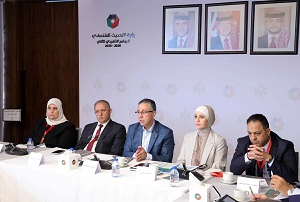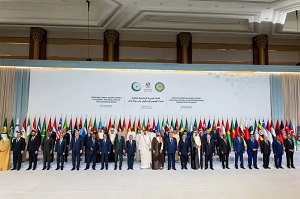Trade sector session discussed 2nd Executive Programme of EMV

The Jordan Times
AMMAN — The sectorial working sessions to prepare the second executive program of the Economic Modernisation Vision (EMV) 2026-2029 continued their work at the Prime Minister's Office on Saturday, where a session was held on the trade sector within the Future Services Engine.
The Minister of Industry, Trade and Supply, Yarub Qudah said that the second phase focuses on strengthening and development, with the necessary amendments to some of the "existing" initiatives in order to ensure the achievement of the goals.
Qudah pointed out that the "upcoming" executive programme requires the continuation of launching new projects in order to ensure the continuity of development and achievement of the desired results in the medium and long term.
He stressed that the discussions focused on "simplifying" trade operations, "facilitating" internal and external trade, building an "integrated" e-commerce system, in order to enhance access to international markets,
Chairman of the Parliamentary Economy and Investment Committee, Khaled Abu Hassan, said that the EMV has achieved "positive" results, stressing that successful investment requires the existence of "clear" and "sound" decisions, in addition to the existence of development initiatives.
He also stressed that the development of the business environment is one of the most "important" indicators that must be focused on, as it "directly" affects competitiveness, calling for continuing to improve the work environment, and following up on the impact of initiatives on the performance of institutions.
During the session, the participants discussed a set of "proposed" development initiatives, with a focus on the regulatory and economic environment, and facilitating partnerships between the public and private sectors.
E-Regulation portal: The initiative is to improve government procedures and services in the business sector, the preparation and implementation of the Jordan E-Regulation Jordan portal, the reform of the sectorial licensing system (nurseries, private educational institutions), and the improvement of government procedures and services in the business sector.
E-commerce: An initiative was proposed to enabling environment for e-commerce; the legislation has been prepared to regulate e-commerce, in addition to projects to support the development of e-commerce, and the development of e-commerce with regard to postal parcels through Jordanian customs.
In addition to develop a "comprehensive" legislative framework for e-commerce that helps small and medium-sized enterprises (SMEs) showcase, and sell their products online, with tools to facilitate e- payments.
Regulations initiatives: In regards to competitive environment, the amended Competition Law was approved, the amended Companies and Special Regulations Law was issued, sectorial studies on the state of competition were prepared, and Consumer Protection Instruction No. (1) of 2017 was amended as part of an initiative to enhance consumer protection.
Developing a modern regulatory environment to facilitate trade is through simplifying and automating customs, tax and shipping regulations, and speeding up government procedures by integrating the informal economy into the formal economy.
Trade Competitiveness initiatives: this initiatives also include enhancing trade competitiveness and expanding access to international markets through a "comprehensive" review of free trade (transport, storage and logistics), expanding the network of trade agreements, establishing a re-export trade portal,
Another proposed initiative is providing "detailed" trade data to support exporters, and innovating financing solutions and stimulating commercial entities through the development of "innovative" financing tools, as well as providing direct and non-traditional incentives, supporting SMEs and encouraging the transformation of family businesses into public companies.
Human Resources: One of initiatives is human resources; including empowering and developing in the trade sector by upgrading skills and expertise in logistics, digital marketing and supply chain management to upgrade the sector's productivity and efficiency.
Unified Database: A "unified" database of goods and services is essential for commercial trade through a "centralized", "open" digital platform that provides accurate and up-to-date data on trade movements (imports, exports and re-exports), which is compatible with government records and in line with open data and privacy protection laws.
Commercial Zones: As well as an initiative to establish dedicated commercial zones within specific sectors, through the creation of integrated commercial zones for wholesale trade (B2B) that bring together major importers and distributors in one location, with specialised warehouses and logistics services.
The aim is to increase supply chain efficiency, reduce costs, support re-exportation, and provide new opportunities in logistics services.
Vehicle Sector: Participants discussed restructuring the specifications of the vehicle sector and reducing the total taxes and customs duties imposed on vehicles in order to promote public safety, protect consumers and expand trade.
Regional hub: Participants emphasised on the "strategic" objectives of the trade sector, namely consolidating Jordan's position as a "regional" hub for trade and re-export, an "attractive" regional shopping destination.
In addition to reducing operating costs and developing a supportive logistics infrastructure, as well as generating employment opportunities in the trade sector and enabling women's participation.
Latest News
-
 Israel launches ground assault on Gaza City
Israel launches ground assault on Gaza City
-
 Qatari emir to arrive in Amman Wednesday for talks with King Abdullah
Qatari emir to arrive in Amman Wednesday for talks with King Abdullah
-
 ‘Gaza is burning,’ Katz says after night of intensive 'Israeli' bombardment
‘Gaza is burning,’ Katz says after night of intensive 'Israeli' bombardment
-
 Arab-Islamic Summit issues final statement, condemns Israeli attack on Qatar, calls for accountability
Arab-Islamic Summit issues final statement, condemns Israeli attack on Qatar, calls for accountability
-
 King delivers Jordan's address at Emergency Arab-Islamic Summit in Doha
King delivers Jordan's address at Emergency Arab-Islamic Summit in Doha